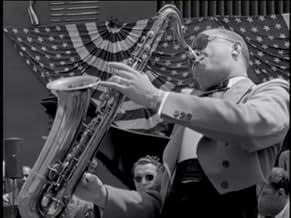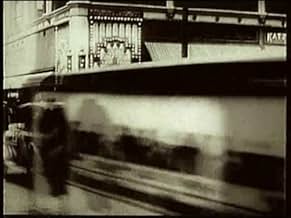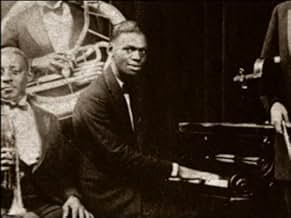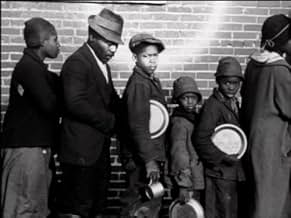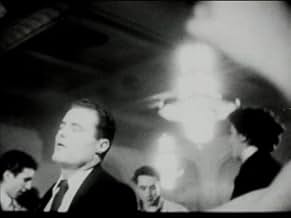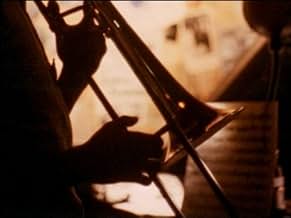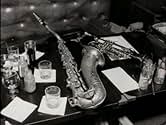Jazz: A Film by Ken Burns
- Mini-série télévisée
- 2001
- 1h 48min
NOTE IMDb
8,6/10
2,6 k
MA NOTE
Ajouter une intrigue dans votre langueA survey of the musical form's history and major talents.A survey of the musical form's history and major talents.A survey of the musical form's history and major talents.
- Nommé pour 5 Primetime Emmys
- 2 victoires et 7 nominations au total
Parcourir les épisodes
Avis à la une
10PCARONA
I've never been one to send in any type of critique or review to any type of website, but after viewing the Ken Burns "jazz" documentary, I knew this was a call to arms. I've never been so moved before by any film/doc etc.. through the brilliant use of historical footage and expert insight that dances along with the music of the day it's a perfect marriage of sound and vision. I was actually brought to tears of joy several times throughout the series. if anyone is even remotely interested in any type of American history/music of any kind or just a lover of great programming ,this is a must for all. A true American classic! not only did this series reconnect me with such intricate American heritage, but introduced me to a whole new world of exquisite, fascinating music that I immediately fell in love with. For this I am forever grateful to Mr. Burns. the only thing I'm not happy about is the fact that now I've been on a constant quest and spending spree of most of my weekly paycheck on a jazz cd purchasing frenzy!!! Ohh well , it's worth every penny ,keep up the superb work and now its time to venture into the civil war series.
I enjoyed watching "Jazz" but as the show progressed I enjoyed it less and less. Much of it is because I simply like the older jazz and swing music and didn't enjoy the more modern free-form style of jazz. Much of it is also because the more I watched the show the more I noticed a few biases. EVERY EPISODE MENTIONED LOUIS ARMSTRONG. While he was a jazz great, it was obvious that Ken Burns REALLY adores Louis Armstrong and I wish he'd just made a show about him! He also strongly loves Duke Ellington. But he also inexplicably skips over some jazz or swing musicians who deserved mentioned--in particular Cab Calloway. He only mentions him BRIEFLY twice--and never positively or in any depth at all. The same could be said for Glenn Miller when the shows were about swing--it wasn't very complementary and was VERY brief (never even mentioning his premature death). This makes me wonder about what I watched--was it really the comprehensive history of jazz or just a particular and biased view? Still, despite this, the shows are well made, have some great music and did get me to appreciate and enjoy jazz and especially swing much more than I had. Worth seeing but I really would like to see some alternate view of the history of jazz, as it just felt like I was missing something.
I am neither a musician nor a serious scholar of jazz, just a fan,but even I could see the flaws in Ken Burns' sometimes fascinating, other times infuriating documentary on the history of "America's music".
Spanning the century, this nineteen hour documentary is most effective at the beginning, when Burns' gift for research is most apparent. You can see the pains he took searching documentation and rare photographs to paint a picture of the roots of the music. However, as the narrative moves on, his over-reliance for third and fourth hand accounts and his own ignorance of the genre becomes apparent.
I am not going to go into the laundry list of "should have" musicians (Lionel Hampton, Stan Getz, JJ Johnson, Charles Mingus gets only ten minutes!) and others that got short shrift or weren't even mentioned. I'd be here all day.
However, I will say that Burns obviously relied too much on critics and writers in putting together his material. Towards the end, especially when they begin to talk of the 50's and 60's, the whole program begins to have the taint of academia all over it.
For example, the 50s phenomenon of the wildly popular California-based "cool jazz" is dismissed by critic Nat Hentoff as "bland" and then never mentioned again.
I am sorry to disagree with the distinguished Mr. Hentoff, but as anyone who has heard the recordings of such greats as Gerry Mulligan and Chet Baker can atest, the music they were producing was just as creative and exciting as their East Coast, black contemporaries.
To people like Mr. Hentoff, the west coast musicians committed the ultimate sin of being white and somewhat popular. Much of the documentary continues along the same "us vs. them" vein.
It seems the people who assisted Mr. Burns took advantage of his ignorance and stamped their orthodox biases on what could have been a great work. Whole genres and types (fusion, Cubano, Brazillian) are either dismissed outright or ignored. It reinforces my view that critics are the most useless species on the face of the planet.
However, I do have to admit that many parts were fascinating. When Burns does interview eyewitnesses to certain events, it shows the flashes of "what might have been". I just wish that he wouldn't have blindly followed the opinions of the the critics and academics and let the audience discover for themselves what to think.
Spanning the century, this nineteen hour documentary is most effective at the beginning, when Burns' gift for research is most apparent. You can see the pains he took searching documentation and rare photographs to paint a picture of the roots of the music. However, as the narrative moves on, his over-reliance for third and fourth hand accounts and his own ignorance of the genre becomes apparent.
I am not going to go into the laundry list of "should have" musicians (Lionel Hampton, Stan Getz, JJ Johnson, Charles Mingus gets only ten minutes!) and others that got short shrift or weren't even mentioned. I'd be here all day.
However, I will say that Burns obviously relied too much on critics and writers in putting together his material. Towards the end, especially when they begin to talk of the 50's and 60's, the whole program begins to have the taint of academia all over it.
For example, the 50s phenomenon of the wildly popular California-based "cool jazz" is dismissed by critic Nat Hentoff as "bland" and then never mentioned again.
I am sorry to disagree with the distinguished Mr. Hentoff, but as anyone who has heard the recordings of such greats as Gerry Mulligan and Chet Baker can atest, the music they were producing was just as creative and exciting as their East Coast, black contemporaries.
To people like Mr. Hentoff, the west coast musicians committed the ultimate sin of being white and somewhat popular. Much of the documentary continues along the same "us vs. them" vein.
It seems the people who assisted Mr. Burns took advantage of his ignorance and stamped their orthodox biases on what could have been a great work. Whole genres and types (fusion, Cubano, Brazillian) are either dismissed outright or ignored. It reinforces my view that critics are the most useless species on the face of the planet.
However, I do have to admit that many parts were fascinating. When Burns does interview eyewitnesses to certain events, it shows the flashes of "what might have been". I just wish that he wouldn't have blindly followed the opinions of the the critics and academics and let the audience discover for themselves what to think.
It takes guts and talent to put together an idea like this and execute on it. Producer and director Ken Burns pulled off something we all wanted see in a documentary film. If it weren't for him, we may not have seen the likes of it in our life time. This near 20 hour epic takes Jazz from its roots to its modern day incarnations. I've learned quite a bit about history of jazz by watching this mini series, but I think the story told is little bit lop-sided. What Ken Burns failed (or purposely omitted) was the entire history of jazz guitarists. There's absolutely none represented in this series - zilch (!), and don't tell me that guitar wasn't an important part of jazz history. What Ken told was the story of jazz keyboard, and horn virtuosos. Not bad, but I still wanted to see some guitar in this series.
Martin Scorsese filled some gap with his "Blues" mini-series about blues guitarists, but a comprehensive history of jazz guitar history is still missing. Would some talented and daring director please take on the challenge ?
Martin Scorsese filled some gap with his "Blues" mini-series about blues guitarists, but a comprehensive history of jazz guitar history is still missing. Would some talented and daring director please take on the challenge ?
The culture of the "People, all the People" has been Ken Burns' great theme. In the first two thirds of "Jazz" he eloquently presents these grand ideas. From Armstrong and Ellington to Billie Holiday and Benny Goodman we are swept along in a vibrant, multi-layered story of something special that would change the world.
But once the documentary reaches the 50's, the tale takes a radical turn. There is a lot of focus on drugs and broken lives. This may be important but these sad endings lead the film on a downward emotional spiral. (I understand why Spike Lee detests jazz musician's stories focusing on drugs.) But at least the music is good.
When the so called jazz music of the 60's and beyond is revealed, we see that the climax of this film is a betrayal of its beginning. The "People's music" has vanished. We see that "real" jazz is elitist and narrow and for the most part is a musical dead end.
We find that "real" jazz is played on acoustic instruments such as trumpets and saxophones. So, electric jazz guitarists are almost never mentioned as well as any electric keyboard players. And the only correct modern style comes straight from Be Bop. We hardly hear any Latin jazz or Fusion.
The great music promoter John Hammond once said that his most satisfying discovery was George Benson. Of course we never hear about Benson because he was popular and he plays electric guitar. No, instead the film's ending becomes an overblown promotion of Wynton Marsalis who since he acts as the film's "senior creative consultant" brings the great story down to an example of petty ego.
Overall "Jazz" has seven excellent episodes about a vital part of history and its effect on the world's music. Enjoy these and after that I would gently suggest to quit while you're ahead.
But once the documentary reaches the 50's, the tale takes a radical turn. There is a lot of focus on drugs and broken lives. This may be important but these sad endings lead the film on a downward emotional spiral. (I understand why Spike Lee detests jazz musician's stories focusing on drugs.) But at least the music is good.
When the so called jazz music of the 60's and beyond is revealed, we see that the climax of this film is a betrayal of its beginning. The "People's music" has vanished. We see that "real" jazz is elitist and narrow and for the most part is a musical dead end.
We find that "real" jazz is played on acoustic instruments such as trumpets and saxophones. So, electric jazz guitarists are almost never mentioned as well as any electric keyboard players. And the only correct modern style comes straight from Be Bop. We hardly hear any Latin jazz or Fusion.
The great music promoter John Hammond once said that his most satisfying discovery was George Benson. Of course we never hear about Benson because he was popular and he plays electric guitar. No, instead the film's ending becomes an overblown promotion of Wynton Marsalis who since he acts as the film's "senior creative consultant" brings the great story down to an example of petty ego.
Overall "Jazz" has seven excellent episodes about a vital part of history and its effect on the world's music. Enjoy these and after that I would gently suggest to quit while you're ahead.
Le saviez-vous
- ConnexionsFeatured in WatchMojo: Top 10 Documentary Mini Series (2015)
Meilleurs choix
Connectez-vous pour évaluer et suivre la liste de favoris afin de recevoir des recommandations personnalisées
- How many seasons does Jazz have?Alimenté par Alexa
Détails
- Date de sortie
- Pays d’origine
- Site officiel
- Langue
- Aussi connu sous le nom de
- Jazz
- Sociétés de production
- Voir plus de crédits d'entreprise sur IMDbPro
- Durée
- 1h 48min(108 min)
- Couleur
- Mixage
- Rapport de forme
- 1.33 : 1
Contribuer à cette page
Suggérer une modification ou ajouter du contenu manquant


